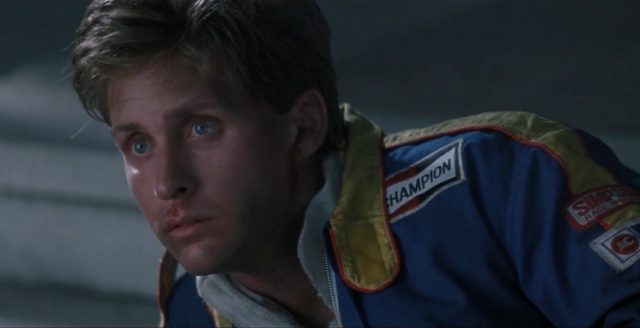
Remember Emilio Estevez? Where has that guy been? If “Freejack” is any indication, he may have disappeared because he went to the future to have Anthony Hopkins’ brain put in him! (That is probably not what happened, though.)
“Freejack” begins in 1991, which was the present when the film was made. Estevez plays Alex Furlong, a race-car driver on the verge of breaking into the big-time. He has an ambitious manager, eager new sponsors, and a hot fiancee named Julie, played by Rene Russo. (Remember Rene Russo? Where has that lady been?) Alex and Julie say a lot of sickening lovey-dovey things to each other in the early scenes of the movie to establish that their love is undying. “Nibble my ear,” he tells her before the Big Race. “For luck!” This is gross, the end.
The lucky ear-nibbling doesn’t work, though, because the Big Race ends with Alex’s car smashing into a wall and exploding. Light petting with your girlfriend is no substitute for safe driving, kids. While this is happening, the movie keeps cutting to a different scene somewhere else, in a place where Mick Jagger is bossing people around and monitoring what happens to Alex. At the very moment of impact, Alex is transported from his death car to wherever Mick Jagger is, a lateral move at best.
Turns out Mick Jagger is in The Future! He’s in the far-off year of 2009. Alex materializes on a table in a medical laboratory, surrounded by science-y doctor guys, and you can tell it’s The Future because their lab suits are made out of tinfoil. You can tell it’s a dark, dystopian future because 1) the future is always dark and dystopian in movies and 2) Mick Jagger is in charge.
So here’s the deal. In 2009, scientists have figured out how to help rich people live forever, just as God always intended for rich people. When you die, they can save your mind/soul/essence/Facebook page on a computer and then download it into a young, healthy body. The only problem is that there are few suitable body donors in 2009 because pretty much everyone is sick and impoverished and addicted to drugs. To overcome this obstacle, scientists figured out a way to help people be healthier.
No, just kidding, they invented time travel so they could steal healthy bodies from the past. They find a moment in history when somebody young and healthy died suddenly, and bring them to the future a split-second before it happens. This process is called “bonejacking,” presumably because 13-year-old boys wrote the movie. Mick Jagger, whose name is Victor Vacendak, is a professional bonejacker (tee hee!) who was contracted to find a new body for an anonymous rich guy.
But something has gone awry in the bonejacking process. Instead of arriving in 2009 with his brain wiped clean and ready to be replaced with some rich person’s, Alex has arrived with his mental faculties still intact, such as they were. He escapes from Victor and the tinfoil guys and is now a wanted fugitive called a “freejack.” (Evidently, unwilling body donors from the past escape custody so often that they had to come up with a word for them.)
Alex doesn’t yet realize that it’s the future, though, the tinfoil lab suits and the ascendency of Mick Jagger notwithstanding. But once he’s on the loose in New York City, he sees more filth and degradation than he remembered New York City having, and more cars that are “futuristic,” i.e., that look like big, slow steel caterpillars. He’s starting to catch on. Then he sees a video display with the date: November 23, 2009. “Hmm,” he seems to think. “‘2009′ doesn’t sound right.” So he looks at his wristband, which says “Grand Prix Championships 1991,” and now seems to think: “Aha! I knew it! It was 1991 when I got up this morning!”
(By the way, I have no personal experience with professional auto racing and am unaware of the protocols, but do they really give each participant a wristband, like the kind you get at a club after the bouncer checks your ID? Is this to let security personnel know that you’re actually in the race? Wouldn’t they be able to tell when they see you driving a car really fast around the track? Has auto racing been plagued by amateurs sneaking into races and passing themselves off as drivers?)
Having double-checked that 2009 is indeed different from 1991, Alex stumbles into a church and asks a nun for help. This nun (played by Amanda Plummer), realizing Alex is a freejack, takes pity on him and uses her highly advanced computer to look up the names of his old associates, to see if they’re still living in New York. (In The Future, computers can do magical things like search the White Pages for people’s addresses!!!) This leads to a lot of chasing and running and escaping, and eventually it leads to Alex finding his old fiancee, still played by Rene Russo with no attempt to make her appear 18 years older. Julie now works for the McCandless Corporation, an evil conglomerate that owns everything in The Future and actually oversees a lot of bonejacking projects. Her boss is Ian McCandless, a ruthless old billionaire. Since he’s played by Anthony Hopkins, speaks in a British accent, and only appears in a couple scenes, I think we’ve figured out who our bad guy is. Don’t tell the movie, though, because the movie was really hoping it would be a surprise and will be disappointed if it knows we guessed early.
Julie assumes that Alex is really just Alex’s bonejacked body with a new brain installed, and he has a hard time convincing her otherwise, even when he shows her the necklace she gave him.
“You gave this to me just before the race!” he says. “Don’t you remember? Julie, that was yesterday! What’s happened to us?”
Well, what happened was that you died in a fiery wreck, there was no body, and then 18 years passed and here you are again. That type of thing has been known to interfere with a relationship.
He succeeds in convincing her that he’s still himself, but not before there’s a lot more chasing and running and escaping from Victor Vacendak and his goons, who are eager to capture the freejack and collect their bounty. They’re in a hurry because time’s a-wastin’ for whichever rich guy ordered the body, because the computers that hold dead people’s minds can only do so for a few days. It seems the scientists who invented time travel and soul transplants couldn’t master the finer points of data storage.
Anyway, Julie has a friend who might be able to help Alex somehow, so they go to meet him at a hip nightclub, which is where all clandestine meetings in movies take place. Since he’s a freejack, Alex’s face is all over TV now, with a $10 million reward for capturing him unharmed. He’ll need to keep a low profile. To that end, he immediately gets drunk at the club, goes on-camera with a TV news reporter who identifies him as the fugitive freejack, and taunts Victor Vadendak. This leads to — that’s right! — more chasing and running and escaping.
Alex is very keen on finding out who paid for his body, as if that will help the situation. Maybe he plans to go to this person and talk him out of it? No, that can’t be it, because the bonejacking doesn’t take place until the buyer has died, and Alex knows this. Maybe Alex is just nosy? At any rate, no one will tell him because it’s supposed to be confidential, and then, big surprise, it’s Ian McCandless, who secretly died a couple days ago and has been pretending to be alive via holograms or some crap, because The Future, or whatever.
To be honest, I’m not convinced that the stakes are very high here. The scientists from 2009 are courteous enough to only steal people from the past who were about to die anyway. They could just pluck people at random, you know! So being bonejacked is basically the same as donating your body to science. You’re dead; what do you care what they do with you afterward, or whose consciousness gets downloaded into your corpse? I guess the fact that it’s not voluntary raises some ethical questions, but I have a hard time getting worked up over matters of principle, especially when those matters are hypothetical and involve an Estevez. I think Alex is just being stubborn. “Oh, how DARE you put someone else’s soul into my body after I’m dead, blah blah blah!” Whatever. Your body can’t have been THAT sacred to you, you raced cars for a living.
Note: Certain elements of this film must be fictional. I lived through 2009 and don’t remember seeing Emilio Estevez anywhere.
— Film.com





